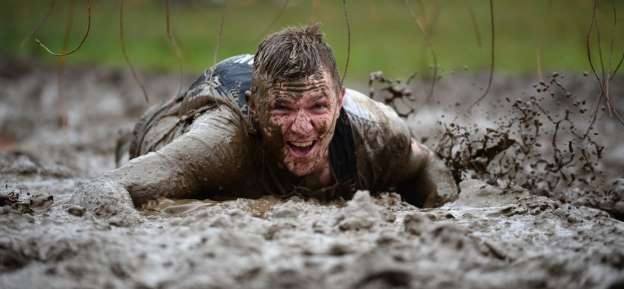Sure, athletes have lots to say about grit, but so does science.
There’s no arguing that extreme athletes know a thing or two about mental toughness. It takes extreme grit to weather a 24-hour obstacle course as punishing as Tough Mudder, so when race champion Amelia Boone shared the following secret for extreme mental toughness, those who want to build grit sat up and took note:
I find that if you start looking at the overall picture, if you start to see how much further you have to go, that’s when you mentally want to check out and that’s when you mentally quit, and so for me, breaking it down into smaller goals helps me through that process.
But it’s also worth mentioning that Boone isn’t the only one endorsing the baby steps technique. Other endurance athletes have recommended the same approach. And so, in fact, does science.
“Slowly, and repeatedly, expose yourself to the thing that scares you–in small doses,” UC Berkeley’s Greater Good Science Center instructs those looking to boost their grit, for instance. But that’s far from the only trick for building mental toughness that science endorses. Research has validated plenty of other approaches for increasing your grit.

1. DRAW ON PASSION.
Grit isn’t just about closing yourself down to pain and fear, it’s also about opening yourself up to love and letting passion for your goals drive extreme effort. And that’s not just what wise men (and women) have said for eons. It’s also what science confirms.
“If you are a parent or teacher looking to foster grit in kids, the first step is to let go of what you want for them, and watch for what they are passionate about. Then, simply support their passions,” positive psychology expert Christine Carter says. This approach works for adults too–passion and purpose are the secret ingredients to extreme toughness.

2. BE PHYSICALLY FIT.
“The fitter you are, the more stress it takes to get you stressed,” says Harvard psychiatrist and author John Ratey. That means that the better shape you’re in, the better you’ll be able to handle whatever struggles life throws at you. Various programs designed to foster mental toughness have come to the same conclusion.

3. WRITE IT OUT.
Greater Good also recommends writing, not to impress others with your style, but as a tool of self-knowledge. “The practice of Expressive Writing can move us forward by helping us gain new insights on the challenges in our lives. It involves free writing continuously for 20 minutes about an issue, exploring your deepest thoughts and feelings around it,” the center explains. In short, the more you know about yourself, the more resilient you’ll be.

4. MEDITATE.
Yes, it does seem that meditation is the prescription for just about every mental challenge these days, but that’s because an incredible stack of science backs up the efficacy of the ancient practice, including for building mental toughness.

5. BE NICE TO YOURSELF.
You might think beating yourself up would give you a thicker skin and some practice in dealing with the unavoidable unpleasantness of life, but actually research suggests you’ll get more benefit out of self-compassion. Greater Good suggests an exercise called “How Would You Treat a Friend?” in which “you compare how you respond to your own struggles–and the tone you use–with how you respond to a friend’s.”

6. GET SOCIAL SUPPORT.
Humans are social animals, and the more social support you can build for yourself, the more resilient you’ll be, according to science. “If people aren’t alone, they persevere,” entrepreneur Nathan Kontny writes, summing up decades of research on the essential social element of mental toughness.

7. FORGIVE OTHERS.
Holding on to grudges takes mental energy that you could otherwise use to persevere in the face of challenges, science shows. That’s why, to optimize your own resilience, you really should forgive others who have offended or hurt you.












